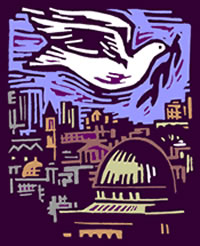
1st Sunday of Advent Year C
The Church begins its new liturgical year with a season of hope. Advent time – when we look forward to the celebration of the birth of the world’s Saviour – has produced liturgies filled with joy and expectation. Advent’s liturgies also look forward to Christ’s ‘Second Coming’, to gather all things into the final Kingdom of God. The liturgy nourishes our faith in the Lord, risen and triumphant. His birth, which we look forward to celebrating, will not take place again. We remember it as the dawning of the final moment of God’s eternal plan, a dawning full of promise for the whole of creation. This fundamental theme of Christian faith and hope - encouraging us to look forward to a ‘new heaven and new earth’ - has been obscured in recent centuries. For sincere believers, expectation of ‘the end of the world’ should convey far more than the uneasiness and dread it so often arouses.
The readings of today’s liturgy show us something of the development of this theme in the faith of God’s people. In the first reading, Jeremiah promises that the messiah – ‘a virtuous branch’, a ruler of ‘honesty and integrity’, belonging to the family of David – will realise all that old Israel hopes for. It is a reassuring message, indeed, for a people whose history had been presided over by rulers who were for the most part corrupt and selfish. We see this prophecy being fulfilled in the gospel reading from Luke. Jesus – knowing that that the final moment of God’s designs for creation had come – made use in his teaching of the symbolic imagery of the prophets and the current (‘apocalyptic’) literature. But he also introduced a startling new dimension to these expectations by uniting them with the coming the ‘Son of Man’ foretold in the Book of Daniel – ‘coming with power and great glory’ to establish God’s eternal reign. The first Christians, who recognised Jesus as the ‘Son of Man’ who had been foretold, and lived in wonder at what God had done in the Lord’s Paschal Mystery, faced a perplexing question. They rejoiced that old Israel’s hopes had been so wonderfully fulfilled in the coming of the Son of God and his victory over all evil. But what were they to make of the fact that the world seemed to go on as before? It is not surprising that they saw themselves living in brief time of waiting before the Risen Lord returned to inaugurate God’s ‘new heaven and new earth’. The Thessalonians to whom, in our second reading, Paul is writing a friendly letter – the earliest Christian writing we possess, written about twenty years after the Resurrection – were wrestling with this problem. They looked forward, in the near future, to ‘the Lord Jesus Christ coming with all his saints’; but, as the letter makes clear, they were confused as they tried to anticipate how this will happen (see 4:13-18; 5:1-11). Paul himself was still coming to terms with the problem we have described. His message to them, however, is reassuring and meaningful, even today: Trust in the Lord, as it becomes clear how this final moment of God’s plan is to unfold; remember the gospel teaching of Jesus - be alert and prepared; above all, prepare for what lies ahead by living according to the Lord’s commandment of love: ‘Love one another, and the whole human race, as much as I love you’.
John Thornhill sm

